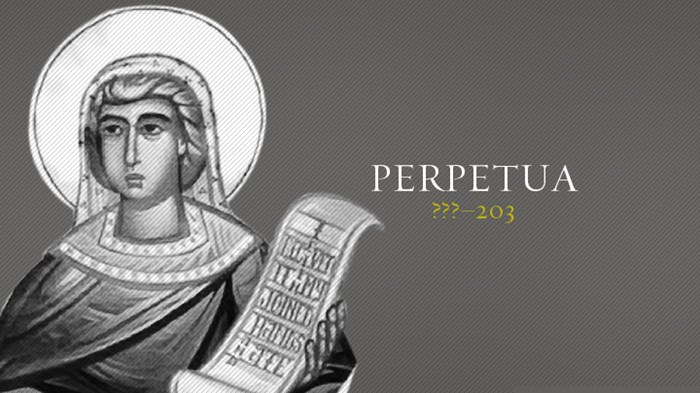
"It will all happen in the prisoner's dock as God wills, for you may be sure that we are not left to ourselves but are all in his power."
We have little idea what brought Perpetua to faith in Christ, or how long she had been a Christian, or how she lived her Christian life. Thanks to her diary, and that of another prisoner, we have some idea of her last days—an ordeal that so impressed the famous Augustine that he preached four sermons about her death.
Perpetua was a Christian noblewoman who, at the turn of the third century, lived with her husband, her son, and her slave, Felicitas, in Carthage (in modern Tunis). At this time, North Africa was the center of a vibrant Christian community. It is no surprise, then, that when Emperor Septimius Severus determined to cripple Christianity (he believed it undermined Roman patriotism), he focused his attention on North Africa. Among the first to be arrested were five new Christians taking classes to prepare for baptism, one of whom was Perpetua.
Her father immediately came to her in prison. He was a pagan, and he saw an easy way for Perpetua to save herself. He entreated her simply to deny she was a Christian.
"Father do you see this vase here?" she replied. "Could it be called by any other name than what it is?"
"No," he replied.
"Well, neither can I be called anything other than what I am, a Christian."
Timeline |
|
|
155 |
Polycarp martyred |
|
168 |
Martyrdom of Justin Martyr |
|
172 |
Montanist movement begins |
|
??? |
Perpetua born |
|
203 |
Perpetua dies |
|
235 |
Bishop Hippolytus of Rome is martyred |
In the next days, Perpetua was moved to a better part of the prison and allowed to breast-feed her child. With her hearing approaching, her father visited again, this time, pleading more passionately: "Have pity on my gray head. Have pity on me, your father, if I deserve to be called your father, if I have favored you above all your brothers, if I have raised you to reach this prime of your life."
He threw himself down before her and kissed her hands. "Do not abandon me to be the reproach of men. Think of your brothers; think of your mother and your aunt; think of your child, who will not be able to live once you are gone. Give up your pride!"
Perpetua was touched but remained unshaken. She tried to comfort her father—"It will all happen in the prisoner's dock as God wills, for you may be sure that we are not left to ourselves but are all in his power"—but he walked out of the prison dejected.
The day of the hearing arrived, Perpetua and her friends were marched before the governor, Hilarianus. Perpetua's friends were questioned first, and each in turn admitted to being a Christian, and each in turn refused to make a sacrifice (an act of emperor worship). Then the governor turned to question Perpetua.
At that moment, her father, carrying Perpetua's son in his arms, burst into the room. He grabbed Perpetua and pleaded, "Perform the sacrifice. Have pity on your baby!"
Hilarianus, probably wishing to avoid the unpleasantness of executing a mother who still suckled a child, added, "Have pity on your father's gray head; have pity on your infant son. Offer the sacrifice for the welfare of the emperor."
Perpetua replied simply: "I will not."
"Are you a Christian then?" asked the governor.
"Yes I am," Perpetua replied.
Her father interrupted again, begging her to sacrifice, but Hilarianus had heard enough: he ordered soldiers to beat him into silence. He then condemned Perpetua and her friends to die in the arena.
Perpetua, her friends, and her slave, Felicitas (who had subsequently been arrested), were dressed in belted tunics. When they entered the stadium, wild beasts and gladiators roamed the arena floor, and in the stands, crowds roared to see blood. They didn't have to wait long.
Immediately a wild heifer charged the group. Perpetua was tossed into the air and onto her back. She sat up, adjusted her ripped tunic, and walked over to help Felicitas. Then a leopard was let loose, and it wasn't long before the tunics of the Christians were stained with blood.
This was too deliberate for the impatient crowd, which began calling for death for the Christians. So Perpetua, Felicitas, and friends were lined up, and one by one, were slain by the sword.

Support Our Work
Subscribe to CT for less than $4.25/month

























